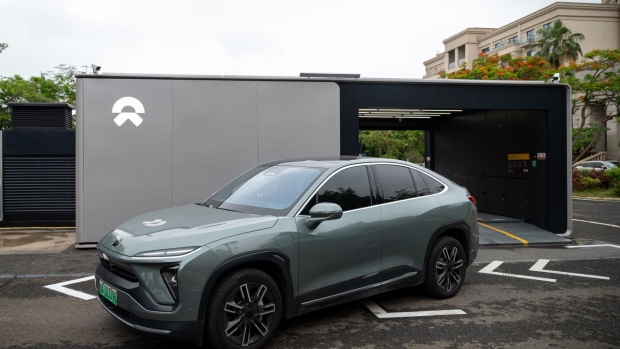May 30, 2023
Chinese Island Shows the Way to an All-Electric Future by 2030
, Bloomberg News

(Bloomberg) -- Forget about range anxiety in Hainan.
With more than 75,000 charging points, electric vehicle owners in urban areas of the tropical island in southern China are usually no more than a mile or two away from somewhere to power up their cars.
The extensive network is part of a plan by the provincial government to end the sale of fossil fuel cars by 2030 and have EVs and hybrids account for 45% of the island’s fleet — the first and only place in China to set such a goal. Its success could help provide a blueprint for the rest of the country to go all-electric in future.
The island has certain advantages when it comes to supporting EVs. It’s about the size of Belgium, meaning most of its 10 million inhabitants make only short trips. The temperate climate helps prolong battery life, unlike, say, Beijing, where the temperature can often drop below freezing in winter. The regional government has also poured tens of millions of yuan into subsidizing EV purchases. All that propelled the province to have the second-highest clean-car adoption rate in the country last year, at 42% of new car sales — behind only the affluent financial hub of Shanghai (48%), which has also given hefty incentives to buyers. All of Hainan’s taxis and buses are also electric.
“The goal will be achieved for sure,” said Zhang Haotian, a salesman for Zhejiang Geely Holding Group Co.’s premium EV brand, Zeekr. “The Hainan government’s strong support, as well as the island’s size and weather, are perfect in supporting it to grow into a market leader for EV adoption.”
When Bloomberg News visited Hainan’s capital Haikou in mid-May, there was an EV charging point on almost every other block. New battery tech was also being deployed, with Nio Inc. debuting its third generation battery swap station in Haikou, which can replace a depleted battery with a fresh one in less than 5 minutes. The automaker plans to build an additional 1,000 battery swap stations and 10,000 chargers.
Hainan resident Chen Yeren only first heard of BYD Co. — now China’s top-selling automaker — when he was offered a job at a dealership after graduating in 2018. For the first two years, he drove a gasoline-powered car, saying he was hesitant about whether an EV was a safe choice. He finally decided to make the switch in 2020, buying a BYD Han as battery technology had improved to allow longer driving range and more of his friends had also started to look at electric cars.
At work, he says customers need less convincing to consider an EV (BYD stopped making conventional combustion engine cars last year) and more prospective buyers come to the dealership saying they feel peer pressure as their friends ditch their gasoline cars.
“I don’t think the 2030 goal adds any pressure on residents,” Chen said. “Consumers here now just view EVs as a better option when they need a new car.”
Beijing views Hainan as a role model to develop the EV industry nationally, and Hainan officials have been invited by other provinces to share the island’s experience in recent months. The next challenge will be transitioning commercial vehicles to electric, where the cost savings aren’t as high as passenger cars because it’s more expensive to charge trucks and other heavy vehicles.
China is still someway off from banning fossil fuel cars. Hainan has a high acceptance of EVs, being a small island dependent on tourism, but these conditions aren’t uniform across the nation, according to Yale Zhang, managing director of consultancy Automotive Foresight.
To be sure, other regions and countries are also making brisk progress toward phasing out gasoline cars. Norway, a country of 5.5 million people, is on track to ban the sale of fossil fuel cars by 2025, with EVs making up more than 83% of the country’s new car sales in April. The UK has said it will stop sales of new petrol and diesel cars and vans by 2030, while Canada and seven US states, including California and Maryland, have set a 2035 deadline.
The task for Hainan probably isn’t as much of a stretch as it is in other countries, said James Chao, chief strategy officer at consultancy IScann Group.
“A key driver of potential success of this program is the fact that the average price of an EV is far lower in China than in the rest of the world,” said Chao, who also heads the consultancy’s automotive division.
“Affordability of EVs has been an issue in Europe and the US, but in China it’s far less of a barrier. This makes the chance of success of Hainan’s sales ban far great even than that of other regions,” he said.
--With assistance from Chunying Zhang.
©2023 Bloomberg L.P.





